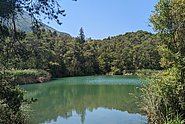Transitioning toward more sustainable livelihoods requires tackling complex challenges in innovative ways. Positioned at the intersection of innovation and transition studies, transdisciplinary research (TD) has surfaced as a method to confront sustainability challenges by integrating various scientific disciplines and engaging non-academic stakeholders. Currently, there is a growing call from both policy makers and research funders to assess the effects of TD research, especially its societal impacts. However, TD research typically involves local projects where the context may substantially shape the effects of the research conducted. In this paper we explore how understanding the context factors of a TD project contributes to the understanding of its effects. We built a working model, based on different established concepts from policy studies to conceptualize context and effects of TD project. We applied the model to a comparative case study of two regional sub-projects of one large TD project on circular bioeconomy for sustainable agriculture in Sub Saharan Africa. The core concept and design were the same for both subprojects, but they achieved different effects. We studied the differences in context factors to explain this variation. We found that a strongly developed public and private sector and access to a variety of action resources such as political support or laws, supported the implementation of innovations as well as dialogue with policy. Nevertheless, a strong public sector can also hinder a project's success, if the interest of the government is not in line with the interests of the project. Further, we found that TD projects may achieve learning and social effects by tackling certain gaps in action resources. Our findings highlight that taking the context of a project into account is key to understanding the scope of action and possibilities of a project. Thus, the context should be considered not only when planning but also - and especially - when evaluating a TD project.
Siehe DOISiehe Institutional Repository DORA

